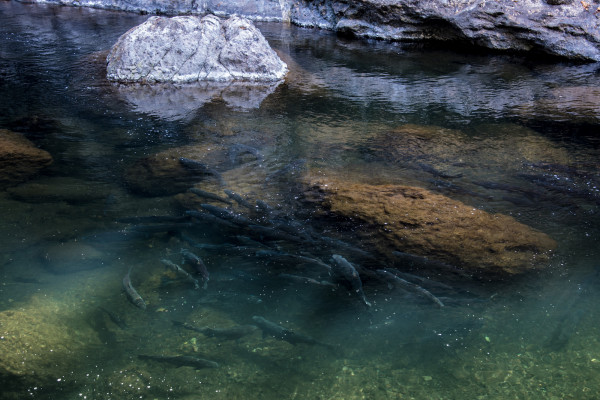Petitioners Native Fish Society, Center for Biological Diversity, and Umpqua Watersheds have submitted a petition to list Oregon Coast Spring Chinook (Oncorhynchus tshawytscha), further referred to as OC-ChS, as a threatened or endangered species under the federal Endangered Species Act. Spring Chinook are anadromous salmonids that spend more than half of their lives in saltwater. For that reason, the National Marine Fisheries Service (NMFS) has jurisdiction over this petition.
The petitioners are filing this petition based on existing rules that grant interested parties the right to petition for issuance of a rule, and specifically to seek reconsideration of a prior determination where new information would lead a reasonable person conducting an impartial scientific review to conclude that delineation of a new ESU, Oregon Coast spring Chinook, and ESA listing is warranted.
Spring Chinook in the Oregon Coast Evolutionary Significant Unit (ESU) were previously petitioned for listing by the Oregon Natural Resources Council in 1994. In their review, NMFS acknowledged the unique life history, habitat needs, and longstanding decline of OC-ChS. However, the ultimate decision that listing was “not warranted” resulted from an agency decision to aggregate spring and fall Chinook populations based on genetic data indicating a polyphyletic evolutionary history. Essentially, it was believed that co-occurring spring and fall Chinook populations were genetically similar to the extent that if the spring Chinook run was extirpated, future runs could be reestablished utilizing the fall Chinook salmon populations from the same area and restored spring Chinook habitats.
New research into the genetic origins of spring Chinook run timing suggest that if their populations are extirpated, co-occurring fall Chinook cannot be utilized to reestablish populations. Instead, once lost, the unique spring Chinook salmon life history is unlikely to re-evolve within any kind of human timeframe. In addition to reviving the remaining populations of Oregon Coast spring Chinook through this listing, it is critical to develop reintroduction plans for extirpated populations and designate critical habitats. As a result of the realization of the distinct, monophyletic pattern of spring Chinook evolutionary lineage we request that NMFS prior “Not Warranted” decision be reconsidered in order to adequately protect the Oregon Coast’s last remaining spring Chinook populations and initiate a recovery planning process.
In 2017, the California based Karuk Tribe and the Salmon River Restoration Council submitted listing petitions to the National Marine Fisheries Service and the California Fish and Game Commission to list Upper Klamath and Trinity spring Chinook under both federal and state Endangered Species Acts. Similarly, the Upper Klamath spring Chinook federal petition requests that NMFS reconsider a previous 2011 “Not Warranted” decision based upon new genetic findings and continued population declines.
Historical review of fish cannery records indicate that OC-ChS populations were present in almost all watersheds draining the Oregon Coast range that included an estuary. By the 1950s most of these populations were extirpated from their former range by a combination of habitat degradation, commercial fisheries, and artificial propagation through hatcheries. A myriad of state management plans documented significant declines between the 1950s and present time. Over the last several decades, OC-ChS have remained at low abundance in a few remnant populations. In 2019, several populations most notably the South Umpqua, faced severely low populations with just 40 fish returning.
OC Spring Chinook survival is threatened by any one or the combination of the following factors:
- The Present or threatened destruction, modification, or curtailment of its habitat or range;
- Over-utilization for commercial, recreational, scientific, or educational purposes;
- Artificial propagation
- Disease or predation;
- Low flow depletion;
- Inadequacy of existing regulatory;
- Other natural or manmade factors affecting its continued existence.

